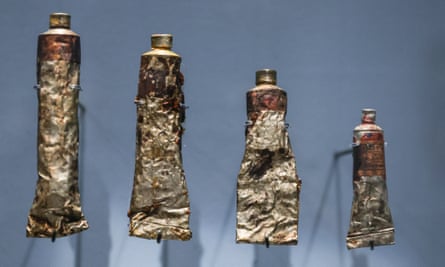
Chennai interior designer creates unique mental wellness boutique
When you meet 30-year-old Neeta Jessani of The Design Storey, the words that come to mind are sunny, calm, and optimistic.
These qualities are not only a reflection of her personality but also the essence she brings to her interior designs, especially at The Love Hope Company, a new, first-of-its-kind inclusive mental wellness boutique in Chennai founded by Pooja Srinivasa Raja.
During our tour of the 3,500-square-foot well-being centre, Neeta shared her vision and approach.
Also Read: Crafting a sustainable and ‘wild’ legacy, one eco-friendly design at a time
Exemplifying inclusivity
The entrance immediately sets the tone for the space. (UC Photostory)
Situated on the second floor of a commercial building in T Nagar, the entrance immediately sets the tone for the space.
The wall opposite the elevator is adorned with mirrors bearing a simple yet powerful message: “Take a deep breath. You’re exactly where you need to be.”
This message embodies inclusivity, making it the first impression visitors experience upon arrival.
The entrance also features The Love Hope Company’s name board as a subtle shadow reflection, adding an artistic touch to the foyer.
“Every piece and part of this space has been curated mindfully,” shares Jessani, who has been running The Design Storey for a decade now.
Also Read: Kerala designer wins at DNA Paris Design Awards 2023 for Vallam Kali-inspired rug; only Indian winner
Meticulous curation
The Love Hope Company’s space includes a reception area, a pantry and huddle space, a workstation, the managing director’s cabin, four therapy rooms, a storytelling and activity room for children, an activity room for adults, and two washrooms.
What distinguishes this space is its meticulous curation, guaranteeing that visitors are not immersed in a somber and uninspiring environment.
It serves as a place to uplift one’s spirit, and the design effectively fulfils this purpose.
Design is where the heart is
Jessani’s journey into interior design stemmed from her lifelong fascination with spaces and textures.
She recalls initially considering pursuing a career in medicine and even studied pure science in school.
“However, my passion for design ultimately won me over, and there’s been no turning back,” shares the designer.
 The entrance features The Love Hope Company’s name board as a subtle shadow reflection. (UC Photostory)
The entrance features The Love Hope Company’s name board as a subtle shadow reflection. (UC Photostory)
Jessani pursued a Master’s in Diploma in interior design at the National School of Design, kickstarting her creative journey.
Following her graduation, she embarked on a six-year stint at an architecture firm in Chennai. Those years served as a guided journey, laying a strong foundation for her career.
However, Jessani’s adventurous spirit led her to Mumbai, where she encountered a different facet of the design industry.
“In Mumbai, I worked on commercial and large-scale projects, including three for Inox. It was a different experience and I loved it,” she shares.
Her return to Chennai, prompted by the COVID-19 pandemic, was bittersweet, but she has no regrets, she tells South First.
Also Read: A Malayali homemaker’s journey to becoming a ₹140-crore clothing mogul
Simple and functional designs
At the core of Jessani’s design aesthetic is the principle of reflecting her clients’ personalities while maintaining simplicity and functionality.
She emphasises, “A clutter-free, minimal space provides clarity and peace of mind. I aim to create functional and straightforward designs, avoiding overcrowding or complexity.”
 The project has been designed with clean lines and warm tones. (UC Photostory)
The project has been designed with clean lines and warm tones. (UC Photostory)
The project at Love Hope has been designed with clean lines, warm tones, and maximising natural light to be in service to the healing of the client’s mental health.
“Each space has a message either on a frame, a neon light, or a crossword puzzle. We wanted to design a space where every individual and every emotion feels validated,” she explains.
Creating a calming environment
Her design process begins with a deep understanding of the client’s vision and needs.
For instance, when working in this space, she collaborated closely with the client to establish a calming and inclusive environment.
“While working for the Love Hope Company, there weren’t any restrictions. However, Pooja and I ensured that no ‘triggering’ colours were used. So, I kept it neutral. Similarly, several finer details have been added to the wellness boutique, to make the space tranquil and to ensure people are seen and heard,” she shares.
 Several finer details have been added to the wellness boutique, to ensure people are seen and heard. (UC Photostory)
Several finer details have been added to the wellness boutique, to ensure people are seen and heard. (UC Photostory)
For instance, the neon light board in the workstation that says, ‘You Matter’ was a thoughtful addition.
“In my journey, be it professional or personal, I have had people — friends, family, mentors, who’ve made me feel that I’ve mattered. At the end of the day, we all want to feel like we belong. So adding this sign in the workstation was important to make not just the visitors but also the employees feel they matter,” she shares.
Also Read: TN fashion designer’s sustainable couture with a cultural twist to make its appearance at London Fashion Week
You matter
Being a mental health care provider is not the easiest job in the world and it can be hard on days.
“The sessions can also get to the professionals when they are part of someone’s healing journey. So, such sign boards and framed panels although a small detail can keep the team spirited,” she shares.
 A storytelling and activity room for children. (UC Photostory)
A storytelling and activity room for children. (UC Photostory)
Her expertise in colour psychology and her emphasis on abundant natural light too have been crucial components in creating a space conducive to therapy.
The therapy rooms are bathed in natural light, creating a feeling of tranquillity and lightness as you enter.
Moreover, the signs on the walls serve to uplift your spirits.
Breaking stereotypes
Navigating the design field as a woman comes with its share of challenges, including stereotypes and biases.
However, Jessani believes that trust and recognition can be earned through experience and successful projects, gradually reshaping perceptions.
 Neeta’s expertise in colour psychology has been a crucial component in creating a space conducive to therapy. (UC Photostory)
Neeta’s expertise in colour psychology has been a crucial component in creating a space conducive to therapy. (UC Photostory)
“It hasn’t been a smooth journey. I face stereotypes and judgments regularly, encountering men who assume they are more knowledgeable simply because I’m a young woman,” she explains.
“Consequently, each day requires a continuous process of proving oneself, which can be draining. However, I believe that the women of this generation will break this cycle, paving the way for better lives for future generations of women,” she firmly states, crediting her family and friends for being her biggest support system.
Also Read: Meet Hinshara Habeeb, Kerala’s first woman entrepreneur to swim in the Shark Tank
The social media dilemma
In the contemporary landscape, where dedicating time to curating an Instagram page can sometimes overshadow one’s professional career, Jessani emphasises the challenges that businesses, particularly smaller ones like her own, encounter.
She remarks, “Balancing the demands of a project with the necessity to create content is no simple task. I would rather be on-site overseeing the work than shooting videos for social media. However, today’s world has pushed people to prioritise the number of likes and followers a page garners over the quality of their work. It’s a regrettable reality. I hope it changes.”
Design cultures & aspirations
With work experience in Mumbai and Chennai, Jessani, talking about design cultures in the cities, highlights differences in social life and preferences.
Mumbai, she says, exudes a more glamorous aesthetic, while Chennai traditionally values practicality over aesthetics.
“However, this is changing, as Chennai residents are becoming increasingly open to diverse materials and finishes,” she shares.
In today’s world, where aesthetics have taken precedence over functionality, the design industry presents unique challenges.
“I stay informed about current trends, but I don’t feel compelled to design solely based on them. My aspiration is to perpetually expand my knowledge and expertise in my field. My primary goal is to contribute to projects exceptionally,” she shares.
Her dream project? To renovate Google’s space if given the opportunity. “Google’s spaces aren’t conventional and it will be fun to work on it,” she signs off.
The Design Storey offers its services across India. Follow Neeta’s journey on Instagram @tdesignstorey
Also Read: Modern but rooted in India: The Purple Turtles’ illuminating design vibe comes to Hyderabad







